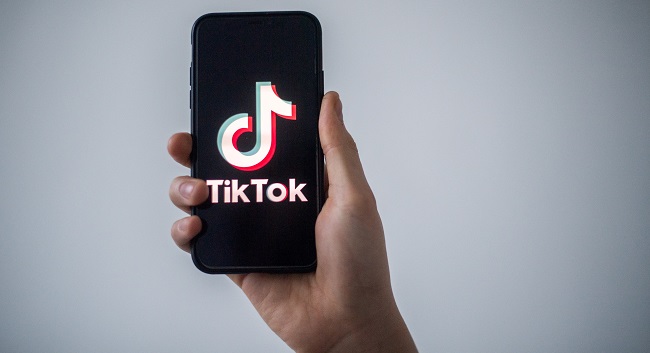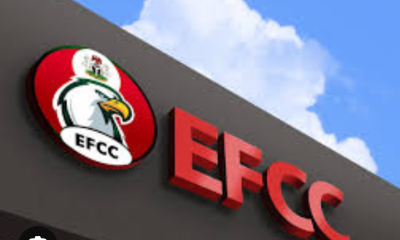Opinion
Tik Tok crisis may linger longer

By Sonny Aragba-Akpore.
While the American ban of Tik Tok is on hold for 75 days beginning from January 20,2025,the European Commission is currently scrutinizing Tik Tok,s practices regarding data protection,advertising transparency and potential addictive design features,particularly concerning young users.
African countries have high usage in general in some countries with Kenya being at the forefront.But some have frowned at its usage.
The restrictions in Europe on the app, are particularly on government employee devices due to security concerns, while in Africa, some nations have completely banned TikTok due to worries about inappropriate content and potential political misuse, with Kenya being a notable exception where usage is high.
Some African governments have banned TikTok due to concerns about the spread of inappropriate content, political rhetoric, and others.
Despite concerns, many African creators use TikTok to showcase their culture and creativity.
The ban in the USA could affect American companies like Apple, Google, and Oracle.
The ban could chill certain types of investment and create a slippery slope that applies to other companies.
A TikTok ban in the United States could have several implications, including:
App store removal where TikTok would be removed from app stores like Apple and Google.
Updates would no longer be available as users are unable to update the app, which could lead to performance issues and compatibility problems.
The app could eventually become unusable without updates.
Data security stands risks of inability to associate with a TikTok ban.
There will be Geopolitical consequences as the ban could raise concerns about the government targeting individual companies.
The ban could send a message that the U.S. government is afraid of the Chinese government influencing Americans.
The ban could make online experiences more insular and inconsistent from country to country.
As the future of the social media platform remains murky, plans for an American entity to purchase TikTok appear to be narrowing in scope.
While several individuals and companies have thrown their hats into the ring with interest, President Donald Trump recently expressed his support of two tech giants: Elon Musk, CEO of Tesla and SpaceX, and Larry Ellison, co-founder of Oracle. Oracle, a software company, houses most of TikTok’s U.S. servers.
Plans are already on to meet the 75-day window to stabilize Tik Tok.
General Atlantic CEO Bill Ford said last week that a deal would get done to save TikTok in the U.S. after President Donald Trump signed an executive order that halted a ban on the app for 75 days.
“It’s in everybody’s interest,” Ford told journalists at an event in Davos, Switzerland. Ford is on the board of directors for ByteDance, Tiktok’s Chinese parent company.
“We’ll get on with it, as soon as maybe the end of the week in terms of negotiating what might work … The Chinese government, the U.S. government and the company and the board all have to be involved in this conversation,” Ford added.
Trump’s executive order paused the enforcement of a bipartisan law passed by Congress last year that required ByteDance to sell TikTok’s U.S. assets by Sunday for the app to continue functioning in the country. It was passed amid national security concerns that the Chinese government could get access to Americans’ personal information through the app.
Tik Tok was taken down for 24 hours after the Supreme Court ruling for its ban before President Trump,s Executive Order for a 75-day stay of enforcement.
But the service interruption TikTok instituted hours earlier caught most users by surprise. Experts had said the law as written did not require TikTok to take down its platform, only for app stores to remove it.
Current users were expected to continue to have access to videos until the app stopped working due to a lack of updates.
The company’s app also was removed from prominent app stores, including the ones operated by Apple and Google. Apple told customers with its devices that it also took down other apps developed by TikTok’s China-based parent company, ByteDance including one that some social media influencers had promoted as an alternative.
Under the federal legislation, which remains in place despite Trump’s order, companies could be fined $5,000 per users they help access TikTok. For Google and Apple, this could mean a $5,000 fine for each user who downloads or updates TikTok. For internet hosting services like Oracle, it could mean a $5,000 fine for each user that accesses TikTok using their services.
To break that down, if reportedly 170 million Americans use TikTok and companies could be charged $5,000 per user, that amounts to about $850 billion in fines, spread across different types of tech companies.
Even for tech giants like Google, Apple and Oracle, these are “hefty fines” they could be facing, according to agency reports.
> Apple and Google will be mostly hit by the ban .App Store specifically listed Tik Tok apps including
TikTok,TikTok Studio,
TikTok ,Shop Seller Center,CapCut,Lemon8,
Hypic,Lark – Team Collaboration
Lark – Rooms Display
Lark Rooms Controller will be affected.
Apple said if a user already has the apps on their device, they will remain there but can’t be redownloaded and won’t provide updates. The apps also won’t allow in-app purchases or new subscriptions during the ban.
Instagram Reels, YouTube Shorts, and Triller are similar to TikTok in functionality but with some minor differences. Reels allows videos up to 90 seconds, Shorts up to 60 seconds, and Triller supports longer videos (up to 3 minutes) with advanced editing tools, ideal for music videos. For more editing flexibility, use Movavi Video Editor to customize your clips before posting.
For adult content creators seeking creative freedom, Triller offers advanced editing tools and music-powered features that turn basic videos into pro-level content, while Likee provides a wide range of effects to make your videos more engaging. When you need even greater flexibility and control, try Movavi Video Editor to fine-tune clips, adjust audio, add special effects, and create smooth transitions.
Prior to the Supreme Court ruling in more than two-hour appearance before a panel of three judges at a federal appeals court in Washington, attorneys for the two sides – and content creators – were pressed on their best arguments for and against the law that forces TikTok and its China-based parent company ByteDance to break ties by mid-January 2025 or lose one of their biggest markets in the world.
Andrew Pincus, a veteran attorney representing the two companies, argued in court that the law unfairly targets the company and runs foul of the First Amendment because TikTok Inc. – the U.S. arm of TikTok – is an American entity. After his remarks, another attorney representing content creators who are also challenging the law argued it violates the rights of U.S. speakers and is akin to prohibiting Americans from publishing on foreign-owned media outlets, such as Politico, Al Jazeera or Spotify.
On Monday September 16,2024,ByteDance and it’s short video platform,Tik Tok appeared at a crowded court in Washington DC,the United States of America (USA) before a panel of three judges to appeal against a law that was likely to ban the company from doing business in the USA by January 2025 if it does not divest its operations.
While this legal tussle was ongoing,Nigerian content creators appeared to be the first victims of this long drawn battle between Tik Tok and the American government.
While the content creators wondered what becomes of their trade,Facebook and Instagram were also making things more difficult for them.
Tik Tok ,Facebook and Instagram may have strong reasons for their actions but not as much as we know.
Meta Group,owners of Facebook,Instagram and WhatsApp last week deleted over 1,600 users in Nigeria for alleged scamming activities.
The deleted 1,600 Facebook groups are allegedly linked to Yahoo Boys.
Opinion
CBN 2024 financial performance an indicator Cardoso’s twerking yielding results

By Dr. Ibrahim Modibbo
The Central Bank of Nigeria (CBN) under the able leadership of Governor Yemi Cardoso has released the apex bank’s 2024 financial statements. The results reflect the bank’s commitment to economic stability, sound policy implementation, and strategic financial management. The financial performance further highlights improvements in external reserves, asset quality, cost efficiency and overall bottom-line improvement.
An indicator of Cardoso’s policy direction being on the right track is manifested by the CBN posting in its latest financial statement showing the country’s external reserves growing from $36.6billion in 2023 to $38.8billion in 2024.
This is phenomenal achievement is largely attributable to the apex bank’s improvement in accretion to external reserves from portfolio investors, diaspora remittances and the federal government receipts following improved confidence in the Nigerian economy, facilitated by better coordination with the Nigerian National Petroleum Company (NNPC) and diaspora engagement strategies.
Another contributory factor is the proper investment management decisions taking by the CBN governor, aimed at boosting the reserves of the bank. This glowing performance reflects the CBN’s firm commitment to external sector stability, ensuring Nigeria is better positioned to meet its international obligations, stabilize the naira, and boost macroeconomic confidence.
Remarkably, the CBN fianancial statement also showed that the bank’s bottom-line improved from a deficit position of ₦1.3trillion in 2023 to a surplus of ₦165billon in 2024. This turnaround is attributable to a direct consequence of apex bank’s effective containment of expenditure, gains on investments made by the bank and increased income from foreign exchange transactions under the Cardoso regime.
The financial statement further showed a notable reduction in loans and receivables from ₦16.1trillion to ₦11.9trillion, due primarily to significant recoveries from earlier intervention lending programmes; a deliberate policy shift away from previous intervention lending and monetary financing through ways and means in line with the bank’s new stance on allowing market mechanisms to drive credit allocation and financial sector development.
To reflect Cardoso’s enthroning of a cost-conscious culture at the CBN, the apex bank adopted a strategy of optimizing and streamlining it’s operating expenses in 2024, through strategic cost rationalization initiatives, including reduction in non-essential spending and streamlined operations across regional branches and departments.
Furthermore, in line with the Financial Reporting Council (FRC) regulatory requirement on ICFR, it is worthy to note that the Central Bank was able to carry out an assessment of its internal controls which was further certified effective by the joint external audit team. This approach resulted in enhanced transparency and accountability in financial reporting, strengthening institutional governance and internal risk controls, and aligning with international best practices in central bank operations
As a testament to the effectiveness of this initiative, the joint external auditors issued an independent assurance report declaring the CBN’s ICFR framework to be “effective” for the 2024 reporting period. However, it wasn’t all cheering news all the way because while the Central Bank of Nigeria’s 2024 financial results reflect operational improvements, some expenditure lines posed challenges.
One of the notable upticks in the apex bank’s expenses in 2024 was related to liquidity management operations. These costs rose to ₦4.5trillion from ₦1.5trillion in 2023. This increase can be traceable to the tightening monetary policy stance adopted by the CBN governor to combat inflationary pressures throughout the year.
In pursuit of that objective, the CBN conducted more frequent and higher-value Open Market Operations (OMO) to mop up excess liquidity arising from fiscal injections at a significant cost. This is a huge responsibility CBN is carrying out on behalf of the federation, whereas in some jurisdictions, this cost is borne by the government.
The financial statements also reflect an increase in the loss on settled derivative contracts during the year from ₦6.3trillion in 2023 to ₦13.9trillion in 2024. This development is a direct consequence of the high volume of derivative contracts settled by the apex bank in 2024. These are legacy transactions which the Cardoso management met on resumption of office.
This proactive settlement effort was undertaken as part of management’s broader strategy to reduce outstanding foreign exchange liabilities, thus lowering its FX exposure, boost net foreign reserves, thereby improving Nigeria’s external buffer and investor confidence, restoring credibility to Nigeria’s forward markets and address legacy obligations transparently.
It can be said that the improved performance of the Central Bank of Nigeria in 2024 is not coincidental but a product of deliberate, and strategic management efforts undertaken by Governor Cardoso. The bank’s leadership has reinforced governance and accountability, instilling operational discipline in the running of the CBN. It has also pursued a balanced monetary policy stance, ensuring price and financial system stability.
These reforms enunciated by Governor Cardoso since his appointment by President Bola Tinubu have collectively repositioned the CBN as a credible monetary authority, with its 2024 financial results serving as proof of its unwavering resolve to support the economic recovery programme of the current administration, safeguard financial stability, and build public trust.
Dr. Ibrahim Modibbo is a public affairs analyst and writes from Abuja.
Opinion
Olorunyomi, Nigeria’s most decorated journalist, takes another award

By Omoniyi Ibietan
For the umpteenth time, Oyekunle Oyedapo Olorunyomi, publisher of Premium Times, possibly contemporary Nigeria’s most honoured journalist, was garlanded earlier today, with the Hallmarks of Labour Foundation (HLF) Award.
Olorunyomi, popularly called Dapsy, famous for his public spiritedness, brilliance, grit and vision, and particularly renowned for his pragmatism and love for investigative and interpretive reporting, media independence, accountability as well as advocacy for public interest journalism, in his words ‘journalism of relevance’, received the HLF-Christopher Kolade Award for Excellence in Leadership and Professionalism in the Media at an event in Lagos.
Reckoning Dapo Olorunyomi’s journalistic antecedents and the trailblazing Premium Times Media Group – which houses the Premium Times newspaper (an online newspaper), Dubawa (a fact-checking entity), the Centre for Journalism Innovation and Development (a tech-oriented knowledge production centre instituted to empower and support African media), and Premium Times Books (a book publishing arm) – the Hallmarks Foundation found a repository to draw form and content that gave expression to professionalism and leadership.
As captured by Premium Times, this award celebrates Dapsy’s “established track record” in championing media independence, accountability journalism, and ethical standards.
An incurable believer in the promise of newspapering for the promotion of freedom and democracy, a leading light of avant garde, innovative journalism in the service of society, iconoclastic and radical, I first took note of Dapsy as a social actor in the Nigerian space after reading the cover story of the African Concord newsmagazine titled, “Has IBB Given up?” an exceptionally objective unsparing analysis of the Babangida regime. The publication’s factuality and poignancy was so stinging as to precipitate the sealing of the premises of the medium for six months and its proscription in 1992 by the military regime.
Unbeknownst to me, Dapsy and I have a deeper historical connection. For instance, he was in the league of student leaders of the early 1980s who pitched their tent in the left pole of the ideological spectrum. It was he and his comrades who drafted the Charter of Demands of the National Association of Nigerian Students (NANS), a document that would become a consequential duty of my generation of student leaders to implement.
Born in Kano, educated at Ife, Oxford, Washington and across the world, ever since Dapsy enrolled at the then University of Ife where he obtained a bachelor’s degree in English and a Master’s in Literature, he has been on the famished road of knowledge production, journalistic rectitude, organised, conscious self and collaborative activities of social action and uncommon charity. As a student at Ife, he spent his holidays working PRO BONO as a press officer at the South Africa’s African National Congress Office in Lagos, and he continued to live a life marked by ecumenism and charitableness.
Exactly two years ago, precisely on January 11, 2023, I published a tribute to honour him when he was announced the first African fellow of the Poynter Institute, alongside 26 other global media entrepreneurs and actors for the 2023 Media Transformation Challenge (MTC) programme. The Poynter Fellowship had recorded 350 alumni as of 2023, and Dapsy broke the jinx by becoming Africa’s first alumnus.
In 2020, the International Press Freedom Award was presented to him. Earlier, in 1995, the World Press Review garlanded him as the International Editor of the Year. In 1996 he was awarded the Freedom to Write Award by the PEN Center, as well as Press Freedom Award by the National Association of Black Journalists in New York. For his involvement in reporting on the Panama Papers, he won a joint Pulitzer Award in 2016. The Global Investigative Journalism Network also honoured him with the Global Shining Award in 2017. Still in 2017, he carted away both the Nigeria Union of Journalists (NUJ) Press Freedom Award and the a distinguishing fellowship of the Nigerian Institute of Journalism (NIJ). Olorunyomi equally received the Diamond Awards for Media Excellence’s Lifetime Award.
He had worked for The Herald newspapers, was an editor at Radio Nigeria, African Guardian, and the African Concord before co-founding TheNews magazine, Tempo, as well as AM and PM News. He became the Enterprise Editor and head of investigation at the Timbuktu Media, publishers of 234Next. Olorunyomi has served on the board of many international organisations including Panos Institute West Africa, Norbert Zongo Cell for Investigative Journalism (a United Nations initiative) and he continued to serve on the jury or as chair or African analyst for many media initiatives or country surveys.
He was the Director Nigeria Project for Freedom House (FH), during which I worked with him as FH’s Regional Media Researcher for the Niger Delta. Freedom House is America’s oldest NGO focused on curating the state of press freedom in over 190 nations and territories. While at FH, he founded the Wole Soyinka Centre for Investigative Journalism (now Wole Soyinka Centre for Investigative Journalism). He was Director for Policy and Chief of Staff to Mallam Nuhu Ribadu, when the latter was Executive Chairman of the Economic and Financial Crimes Commission. It was he who essentially developed crime prevention and education policy at EFCC.
He was on exile for a while when the Abacha regime launched a serial crackdown on activists and journalists. He returned to Nigeria at the onset of Nigeria’s renascent democracy and continued his works without ceasing as a dedicated Nigerian patriot. In 2021, he was arrested ostensibly for publishing a libellous story about former Army Chief Buratai, an incident that suffered a natural fate as cases of unsubstantiated allegations.
The Development Agenda for Western Nigeria (DAWN) Commission aptly described Olorunyomi as ‘Akinkanju’ (the Valiant man) of Nigerian journalism. His story continues to serve as an unvarnished reminder of the value of focus, love for man and country, determination, selflessness, and living for others.
Dr. Omoniyi Ibietan is the Head of Media Relations, Nigerian Communications Commission (NCC).
Opinion
Fate of Critical National Infrastructure protection

By Sonny Aragba-Akpore
On June 24,2024,President Bola Ahmed Tinubu signed an Executive Order for the protection of information and communications technology (ICT) equipment in order to build a robust economy.
Captioned DESIGNATION AND PROTECTION OF CRITICAL NATIONAL INFORMATION INFRASTRUCTURE ORDER, (CNII)2024, the order derives its power from Cybercrime Act of 2015.
Specifically, this is In exercise of the powers conferred on the President by section 3 of the Cybercrimes (Prohibition, Prevention, Etc.) Act, 2015 (as amended), and all other powers enabling him in that behalf.
“The objectives of this Order are to designate certain Information and Communications Technology systems (ICT), networks and infrastructure operating in Nigeria, as Critical National Information Infrastructure (CNII) , develop cohesive measures and strategies for the security and protection of CNII, and ensure their continued operation .
The order specifies adoption and proactive holistic approach in the identification, security and protection of CNIl; reduce to the barest minimum, incidences capable of damaging, disrupting, or interfering with the operation, functionality, or integrity of CNII .
The order is essentially to ensure the effective functioning of ICT systems, networks, and infrastructure, which are critical to driving national imperatives, economic development, national security and defense, public health and safety, and government operations.
It lists Computer systems, networks, and communication infrastructures acquired, installed, deployed, and operated in sectors of the Nigerian economy as in the Schedule to this Order as critical and are hereby designated as CNII.
But beautiful as the document is,its impact is yet to be felt.
Inspite of the good intentions thereto, not much has been done or heard in this regard as it appears the document appears confined to government archive as one of those policies that have good intentions but remain slow in implementation.
Strangely, nobody is even talking about it and industry players are worried.
As for the Cybercrime Act from where this order was derived, very little has come from there too except pockets of arrests and prosecution especially of persons who may have alleged to have carried out cyberstalking and others.
The CNII order requires strong implementation especially if we intend to build a resilient and robust economy and sustain and protect telecommunications infrastructure, grow the ICT sector to improve on the Gross Domestic Product (GDP) among others.
Not much has been heard or implemented since 2024 when the order was signed and it is worrisome that such a beautiful policy is allowed to rot away in the back waters of governance.
CNII refers to interconnected systems; networks that are indispensable for the functioning of the nation’s economy, security, public health, and general safety. These information infrastructures ensure seamless communication, data storage, and operational continuity in both private and public sectors.
Examples of CNII include telecommunications networks, financial systems, transportation management systems, national power grids, national identity management system among others.
Disruption to any of these systems could result in significant economic losses and distress.
Legal experts explain that Office of the National Security Adviser (ONSA )is tasked with leading efforts to protect CNII by collaborating with relevant stakeholders to establish a Trusted Information Sharing Network (TISN) that would encourage the exchange of information across various sectors of the Nigerian economy.
The Order also empowers the ONSA to conduct regular audits and inspections of CNII to ensure compliance with applicable laws, guidelines, and rules.
Additionally, the ONSA in collaboration with relevant CNII stakeholders is required to develop and implement a Critical National Information Infrastructure Protection Plan (CNIIPP) and other measures to prevent unauthorized access, theft, vandalism, destruction, and unlawful interference with the operation of CNII.
This is to minimize risks and reduce incidents that could disrupt or compromise the functionality of this CNII.
Pursuant to the Act, individuals who commit offences against CNII, specifically, unauthorized access, tampering, or interference with CNII, shall upon conviction be liable to imprisonment for up to 10 years. Where such acts result in grievous bodily harm to individuals, the imprisonment terms extend up to 15 years. In cases where such offences lead to the loss of life, offenders are liable to life imprisonment.
The designation of telecom infrastructure as a critical national infrastructure may not address the challenges of vandalism except the government displays the political will to enforce the Order.
The immediate past government had approved and also directed that necessary physical protective measures be put in place to safeguard telecommunications infrastructure deployed across the country.
The presidential directive, mandated Office of the National Security Adviser (ONSA), Defence Headquarters (DHQ), Nigeria Police Force (NPF), Department of State Services (DSS), and the Nigeria Security and Civil Defence Corps (NSCDC),to ensure protection of the infrastructure and were properly notified of the President’s directive and were expected to enforce same as directed.
But very little was done because this had no impact as vandalism of the infrastructure remained a daily occurrence across the country to date.
That is why this government should sum up the political will to implement this Executive Order, safeguard the infrastructure and fuel the economy.
Communications, Innovation and Digital Economy Minister, Bosun Tijani explained at the advent of the document that “the order is a significant step that would strengthen and protect investments in the ICT sector by reducing incidences capable of damaging the operations and functionality of the country’s technological systems, infrastructure, and networks.”
The Minister added that designating telecom infrastructure as CNII would help improve the quality of telecoms services, which has often been affected by disruption and intentional damage.
“This gazette now makes it an offence to wilfully damage assets such as telco towers/sites, switch stations, data centres, satellite infrastructure, submarine & fibre optic cables, transmission equipment, e-government platforms, databases among many others,” adding that government would continue to work to create an enabling and supportive environment and policies for the digital economy to thrive.
The Order identifies areas that are critical for protection as: power and energy sectors of the economy, water; information, communication, science and technology ;banking, finance and insurance ;health ;public administration; education ;defense and security transport; food and agriculture; safety and emergency services; industrial and manufacturing; and mines and steel.
The order states that the National Security Adviser (NSA) may, with the approval of the President, update the list of sectors in the Schedule to this Order, taking into consideration emerging technologies and platforms, in line with the Cybercrimes (Prohibition, Prevention, Etc.) Act (“the Act”), and the National Cybersecurity Policy and Strategy (“the Policy”).
And any update made pursuant to the listed areas shall be published in the Federal Gazette.
“The Office of the National Security Adviser (ONSA) shall, in collaboration with relevant CNII stakeholders, develop a comprehensive Critical National Information Infrastructure Protection Plan (CNIIPP) ; and guidelines, specifying minimum standards, rules, and procedures for the protection, preservation and general management of designated CNII,for the approval of the President.”
“The ONSA shall, in collaboration with relevant CNII stakeholders, establish a Trusted information Sharing Network (TISN), as a multidisciplinary framework, comprising owners and operators of CNII ;representatives from relevant Ministries, Departments, and Agencies of government (MDAs) ; and identified private sector organisations, to build and execute awareness campaigns on risks to CNII, share information and techniques required to assess and mitigate risks in a decentralised manner across sectors of the economy, and implement capacity building initiatives to strengthen and mainstream resilience and protection of the infrastructure and networks.”
Members and entities within the TISN shall collaborate and share information on threats and vulnerabilities, and develop strategies and solution to mitigate known and evolving risks.
How much of this has been implemented across board leaves us guessing.
Before the Presidential intervention,it has been a tale of woes by stakeholders in the Nigerian ICT sector who have been calling on the government to designate telecom infrastructure as a critical national infrastructure to address the challenges of persistent attacks on the infrastructure across the country.
In March 2024,the Operators reiterated the call as Nigeria suffered an internet outage due to damage to some fibre optic cables.
“In 2023 alone, MTN Nigeria suffered more than 6,000 cuts on its fiber cable. The operator relocated 2,500 kilometres of vulnerable fiber cables between 2022 and 2023, at a cost of more than N11bn —enough to build 870 kilometres of new fiber lines in areas without coverage.”
Early in August 2024 ,Chief Executive Officer of Airtel Nigeria, Carl Cruz, while speaking during an industry forum, said the telecom company had been recording an average of 1,000 cases of fibre cuts every month.
-

 News6 hours ago
News6 hours agoWhy ‘VeryDarkMan was arrested – EFCC
-

 News18 hours ago
News18 hours agoMassive turnout as Bishop David Abioye holds first service in new church + Video
-

 Economy17 hours ago
Economy17 hours ago75.5% of rural Nigerians now live below poverty line — World Bank
-

 Education9 hours ago
Education9 hours agoOver 1.5m candidates score less than 200 in 2025 – UTME
-

 News18 hours ago
News18 hours agoHow US-Based Yoruba Monarch Died After Brutal Assault In Oyo Palace, Allegedly Ordered By Alaafin Amid Supremacy Row With Ooni Of Ife
-

 Entertainment6 hours ago
Entertainment6 hours agoHow I narrowly escaped death in U.S hotel room – Seun Kuti
-

 News8 hours ago
News8 hours ago‘S3x is good, I enjoy it,’ Bishop Adejumo tells wives
-

 News17 hours ago
News17 hours ago‘Cabals’ still fighting against our refinery — Dangote


















